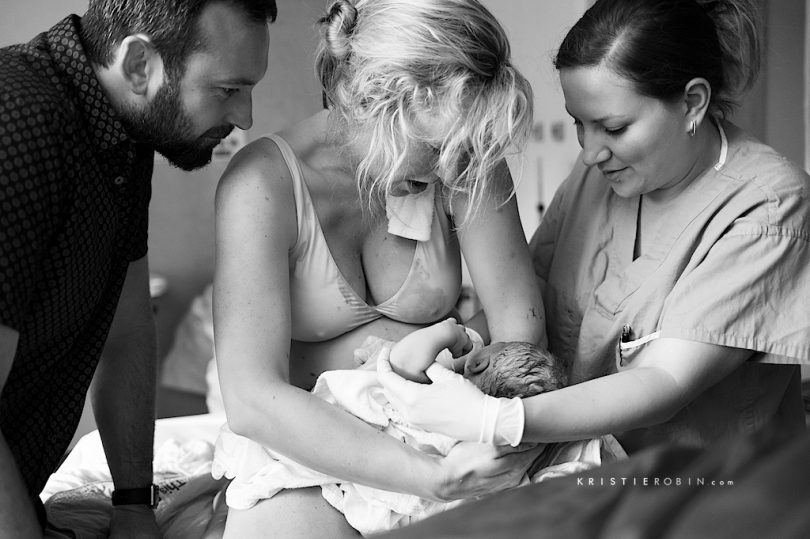First-time mother Margaux Delattre always knew she wanted to deliver her baby at St. Paul’s Hospital where she was confident she would receive the best possible treatment. But instead of a family doctor or obstetrician, the promise of excellent post-partum care motivated her to work with a midwife instead.
“Having no family here, I thought they would be a great help. I looked online for midwives who have privileges at St. Paul’s, and they were close to my home,” said Delattre, who is actually a cardiac nurse there.
Living only three blocks away, Delattre was able to walk to the hospital when it came time to deliver. She pushed for three hours but to no avail: the baby was synclitic, which meant her neck was twisted to the right and she couldn’t be engaged properly. The midwives consulted the obstetric team at St. Paul’s and they decided on an emergency C-section.

Following the delivery of beautiful baby Matilda, now eight weeks old, Delattre was happy with her decision to engage the services of midwives, including post-partum when she faced challenges with breastfeeding. The midwives visited almost every day for a week and the new mom felt supported without having to leave her house. She encourages other low-risk pregnant women to seriously consider the midwife option.
“Being pregnant is wonderful and exciting but it can also be stressful, especially during your first pregnancy. Midwives have a holistic approach to care and are very present during each step of your pregnancy and the first six weeks post-partum,” said Delattre “It’s also important to know that they work closely with obstetricians, GPs and obstetric teams if any complications arise. When I had my emergency C-section, both midwifes were in the OR with me, supporting me.”
Midwives celebrate 20th anniversary in BC
This year marks the 20th anniversary of the legalization of midwifery in BC and Delattre’s positive experience reflects how midwifes can enhance the quality of care for low-risk pregnancies for both mother and child.
BC is a leader in this area of health care with midwives assisting with almost one in four pregnancies in the province — the highest rate in Canada. What may come as a surprise for those unfamiliar with this profession is that midwifery is a safe, recognized and growing choice for pregnancy and birth care in BC and around the world, and founded on evidence-based best practice.
Midwives are provincially registered primary care providers who receive extensive medical training in university that specializes in pregnancy, birth and post-partum care for women and babies. They facilitate births in hospitals and at home. Midwives are fully integrated into the health care system and their services are covered by MSP.

St. Paul’s has five core midwives and 25 more who have dual privileges here and BC Women’s Hospital. Patrician Rohlfs, assistant head, department of midwifery and St. Paul’s lead, says the midwives are a diverse group as many grew up abroad and speak a variety of languages, including French, Arabic, Farsi, and German. Parents say one of the biggest benefits of working with a midwife is the quantity of quality care. Midwives follow the same appointment schedule as GPs or obstetricians but their appointments are lengthier, lasting approximately 30 to 45 minutes. Within those visits – at home or at hospital – midwives address the clinical and holistic aspects of care such as nutrition, stress, education about pregnancy and birth, and information about upcoming tests and procedures.
Midwives support moms after birth
Another plus is the continuity of care. Not only are St. Paul’s midwives – working in teams of two – there for the mother through the entirety of the pregnancy, they are in attendance for the whole labour and afterwards. Once the baby is born, midwives conduct several home visits, seeing the new mother and baby every second day to help the mother establish a connection with the baby, ensure the baby isn’t losing too much weight, complete clinical assessments, and troubleshoot problems such as breastfeeding difficulties.
In BC, mothers often don’t stay for more than 24 to 36 hours in the hospital post-delivery, provided everything goes smoothly. The ones who do not choose the midwifery path usually don’t see their care providers for another few days. They are otherwise on their own with a newborn baby.
Working with a midwife offers plenty of flexibility. Mothers can deliver in the hospital or at home, or can change their minds and go from home to hospital.

“At the core of midwifery is the patient’s ability to make informed choice decisions, and respect for her autonomy. Care is tailored to the specific needs of every patient and family,” said Rohlfs.
Rohlfs adds that women really appreciate the considerable amount of time they have with their care providers, and that there’s continuity to that care. They are never alone.
“And while the moms are really grateful for us, some of our most enthusiastic supporters are their partners. There is always so much pressure on partners to be the perfect coaches for a game they’ve never played, and with rules they don’t know. Knowing we’re alleviating that pressure is a huge relief for many of them,” said Rohlfs.
According to the Midwives Association of BC, registered midwives have assisted in more than 91,000 births in BC since the profession was legalized in 1998.






Bravo Patricia et toute l’équipe!